Papers by Emmanuel S Dandaura
DOAJ: Directory of Open Access Journals - DOAJ, Sep 1, 2015
DOAJ: Directory of Open Access Journals - DOAJ, Jun 1, 2016
DOAJ: Directory of Open Access Journals - DOAJ, Dec 1, 2018
INTRODUCTION Like in the pre-colonial days, there is a new struggle and partition for Africa. Thi... more INTRODUCTION Like in the pre-colonial days, there is a new struggle and partition for Africa. This time the struggle is not limited to physical territories or the natural resources, it is in fact, the struggle for the heart and soul of the African through its mediated content.
International Journal of Critical Infrastructures, 2022

2015 International Conference on Cyberspace (CYBER-Abuja), 2015
This paper presents an investigation of the use of social networking service among youths aged 16... more This paper presents an investigation of the use of social networking service among youths aged 16 through 25 years, in Nigeria.The convergence of information systems and networks, the Internet and mobility has brought about a fundamental shift on how people generate and share information. Specifically, social media has emerged as a powerful tool in a digitally connected world, touching every aspect of human existence. This paradigm swing cuts across people of diverse age albeit affects each age category differently. This work presents the outcome of a study conducted in select towns in central part of Nigeria between January and June 2015. The focus was to determine how youths (age 16 through 25) use social media platforms in terms of the frequency, and purposes of social networking site usage. The survey revealed that, 99% of the respondents have social media accounts out of which 95.2% use smartphones to access various social media platforms. 46.4% from the respondents fall under the category of those very likely to use social platforms in a week, while 26.8% account for those who are extremely likely to use the social networking service within same time frame. Only 0.7% of the respondents were not likely to use social networking service within a week. Among the twelve social media platforms surveyed, Facebook ranked top as the most commonly used social networking channel with 91%, followed by WhatsApp (87%) and Tango ranked last at 1%. Based on the analysis of the result, it is highly likely that social media may have severe impact on young people who have no form of restrains with consequences of huge distractions and privacy intrusions. Conversely, the fact that social media is rapidly building social and communications habits into the youths point to its potential to enhance their learning habits if properly harnessed and formalized to aid pedagogy at secondary and tertiary levels.
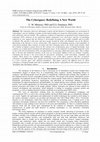
The cyberspace driven by information systems and the Internet is transforming our environment in ... more The cyberspace driven by information systems and the Internet is transforming our environment in extraordinary ways by enabling economic growth and providing new means by which people connect, interact and collaborate with one another. The continuous evolution of components of information and communications technology (ICT); advances in the underlying digital components (core electronics) and the corresponding reduction in costs suggest that the Internet is increasingly becoming more readily available and accessible worldwide. The outcome is that more and more people around the globe will ultimately rely on the effective functioning of the Internet to survive and prosper. This suggests an unremitting upsurge of the population of cybercitizens globally. Most countries no longer take these emerging trends in the virtual world casually. Aside the evolution of digital economy driven by the extensive use of information space or digital knowledge, most countries are working hard to dominate the information space. As the industrial revolution bifurcated the world, so also is the level of exploitation of the vast opportunities on cyberspace bifurcating nation states. This is simply due to the fact that traditional activities of all sorts are increasingly shifting to this new domain. Certainly, cyberspace has become a new focal point for innovations, enterprises, social networking, criminality and warfare. These factors are reshaping and redefining a new world. Most countries that have recognized cyberspace as the fifth domain, have, equally elevated their perception of the domain as an abstract virtual space to a more concrete space with 'physical boundaries'. This paper explores the different levels at which cyberspace is bringing benefits and risks to mankind, and the factors responsible for the widening gap between 'developed' and 'developing' nations.
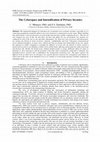
The widespread adoption of cyberspace for exceptional socioeconomic activities, especially as it ... more The widespread adoption of cyberspace for exceptional socioeconomic activities, especially as it is connecting populations around the globe in ways never foreseen is raising fresh security issues. What is fuelling this embracement, is the pervasiveness of social media and innovative mobile computing devices. This has not only changed our ways of life, but also blurs the lines that define the way governments run, business are conducted as well as the way we use and share information. Yet, these new ways of services and interactions, are raising new threats in terms of privacy, integrity, confidentiality and trust. Cyberspace transactionscut across national boundaries, in many cases, without any form of existing trust relationships of any sort. Again, the explosion in mobile computing is extending the influence of social web; the manner in which content is shared and accessed is now defining a symbol of new global status, affecting and merging the realm of personal and business life. Besides the threats from criminal minded people or group, deliberate efforts by states to dominate (or show supremacy) with the potential to halt other states economically, politically or militarily, lies intensified privacy invasion that is unfamiliarto the unsuspecting technology user. This paper explores the different levels at which users of cyberspace are exposed toprivacy invasion, the consequences and manner in which some of the risks can be mitigated even as we continue to record steady upswing of mobile computing by cyberspace users.
This paper interrogates the place of indigenous language as catalyst of development. It examines ... more This paper interrogates the place of indigenous language as catalyst of development. It examines the peculiar status of indigenous Nigeria languages vis-à-vis the global landcape as well as identified some of the factors responsible for the endangered nature of nearly 70% of the 521 identified Nigerian languages as well as the special experiments with indigenous language newspapers as vectors of change and means of rejuvenating Nigeria’s endangered languages
African theatre has from time immemorial been the principal medium through which indigenous stori... more African theatre has from time immemorial been the principal medium through which indigenous stories were told for societal reflection, healing and empowerment of the people. This paper argues that as the most culturally diversified continent, understanding what makes Africa unique requires close interaction with her performing arts.
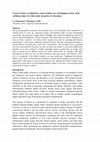
The growing global economic uncertainties have in recent times been attended by a cutting down of... more The growing global economic uncertainties have in recent times been attended by a cutting down of costs by corporate bodies and families alike. In most developing economies, the perennial scaling down of budgets has meant dwindling provisions for leisure and entertainment. This accounts for the sharp drop in theatre attendance in most of these countries. In Africa where people are used to enjoying folk theatre performances in the open community squares for free, the idea of paying for tickets to attend theatre becomes more and more unattractive. The growing cases of global terrorism and general insecurity in most societies has made it even more difficult for families to see the wisdom in risking attending theatre productions at night, what more to spend scarce family income on tickets when there are cheaper and safer alternatives at home by way of cable television and soap operas. The theatre critic's job is in jeopardy if the theatre makers are not producing. Undaunted the theatre makers have been reinventing their audience engineering strategies and production approaches. This paper is an incursion into the new approaches theatre makers have adopted to keep their art and professionalism afloat in the face of persisting harsh social and economic realities.
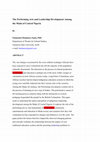
The vast changes occasioned by the cross-cultural exchanges Africans have been exposed to since C... more The vast changes occasioned by the cross-cultural exchanges Africans have been exposed to since Colonialism has left the majority of the population culturally disoriented. The distortion to the process of cultural production, socialization and education is perhaps one of the most visible vestiges of colonialism in most African societies today. Long before Colonialism, most African societies had developed indigenous education systems in which the young were carefully inducted into their various roles in the societies. Among the Mada, for instance, the Performing Arts played a central role in the process of initiating its new crop of leaders. The performative nature of the learning process contrasts sharp with the abstraction in western pedagogy bequeathed the people by the British Colonialists. This paper seeks to understand the nature and pattern of indigenous leadership development among the Mada of Central Nigeria. It explores the role of the performing arts as vital instruments of socialization, orientation, entertainment and education in Mada society and examines how this vital
This paper elucidates the challenge faced by the modern African theatre critic using two performa... more This paper elucidates the challenge faced by the modern African theatre critic using two performances that were staged on 1st March 2017 as part of the Lagos Theatre Festival.
The question of identity became dominant in African theatre at the onset of colonialism. The colo... more The question of identity became dominant in African theatre at the onset of colonialism. The colonial masters imported into Africa their kind of theatre, which was in many respects different from the type that existed in pre-colonial African societies. As is to be expected, consequent upon the interaction between the two cultures, there now exist syncretic forms of entertainment, which are a fusion of the two theatre traditions. At the level of theory, both the African and European theatre traditions have their distinct aesthetic canons. Negotiating these canons is part of what makes the task of the theatre critic in Africa engaging but tricky. This paper examines the challenge of negotiating cultural identity through theatre, performance and criticism in Africa.

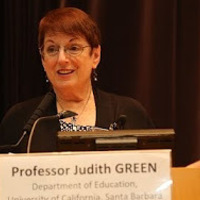









Uploads
Papers by Emmanuel S Dandaura
In a way, both Theatre for development (TFD) and Development entertainment (DevEnt) court entertainment and indigenous theatre aesthetics albeit in slightly different proportions. Traditional TFD process begins with the identification and prioritising of the development challenges of the partnering community and then tries to identify the appropriate indigenous theatre or communication media that can be used as vehicles to engender discussions on the prioritised development challenge(s). Thus the choice of workshop theme, timing and expected results are often set by the facilitators who may not necessarily be resident in the host community. DevEnt, on the other hand, keys into the community’s life cycle and calendar of festivals and other routine indigenous entertainment forms. The process begins with the people expressing themselves through their routine cultural performances and festivals while the facilitators, if at all they are externally located, serve as observant-participants. The external facilitator in this case takes the back bench in this mutually-beneficial learning process and allows the resident facilitator share his/her experiences through whatever cultural medium he/she is conversant with. The external facilitator participates by asking critical questions about the performance and development related issues that emerge therefrom. In trying to answer these questions, the resident facilitator is encouraged to take a deeper but objective look at the development challenges confronting his community. In the end, what emerges is a sharing of experiences between the two sets of facilitators in a way that strengthens the capacity of the resident facilitator to facilitate the use of such indigenous entertainment forms to advance group analysis of common problems facing the community on a continuous and sustainable manner. This often leads to development at the human level and invariably, also at the material level.
"CYBERSPACE GOVERNANCE:The Imperative For National & Economic Security"